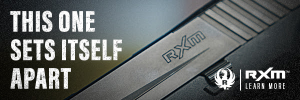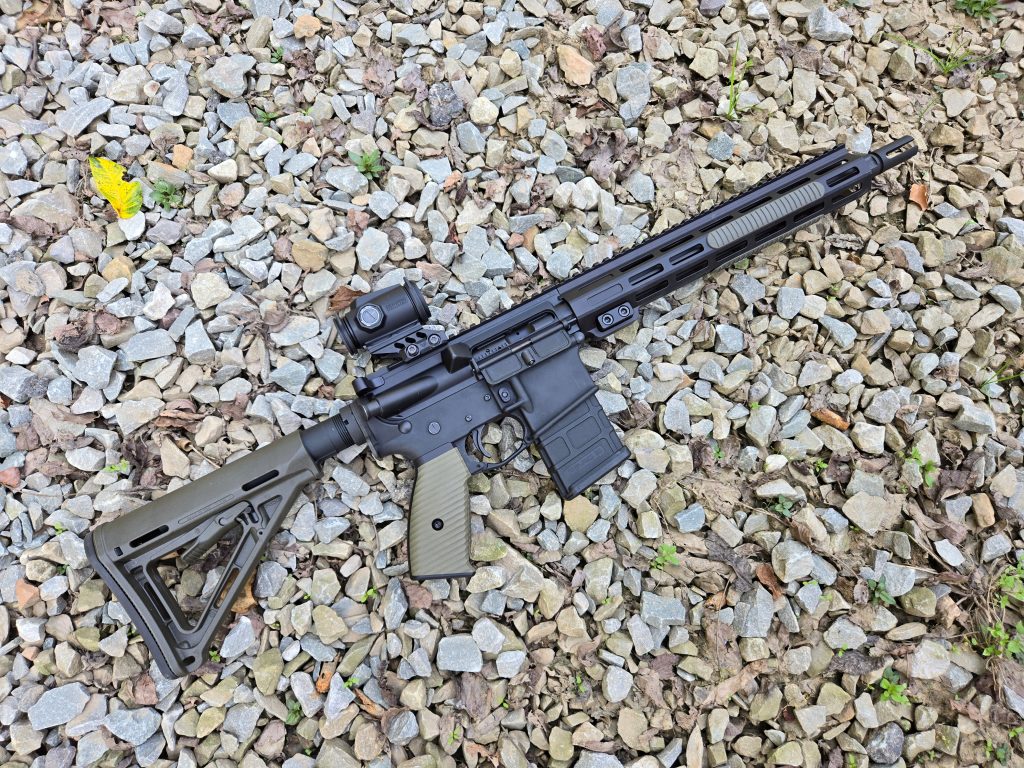
I do a good bit of AR builds, but most of them are military clones or military inspired builds, mixed with some occasional fun builds. When I had the opportunity to check out one of X2 Dev Group’s Trident barrels this summer I was excited, but also a little hesitant.
It was a big jump over barrels that I had been using. I wasn’t sure how if I had the parts to put together a build that would do it justice. I also wondered about knocking the rust off of my bench rest shooting to give it a fair shake. There was only one way to find out though, so I took the plunge.
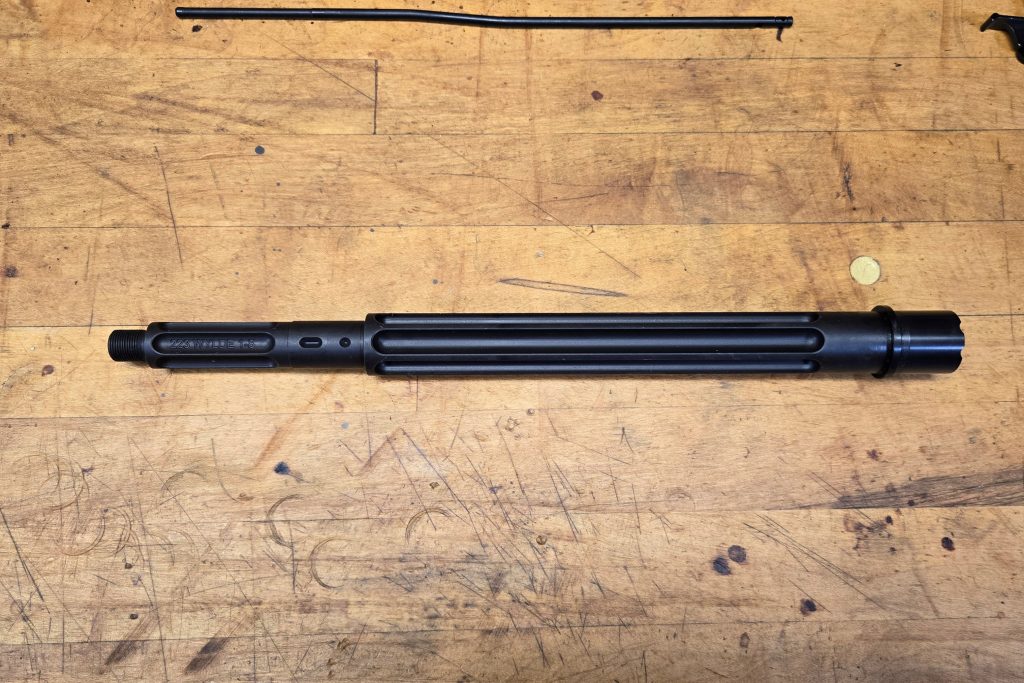
The Soul of the Rifle
If the receivers are the body of a rifle, and the bolt is the heart, the barrel is the rifle’s soul. You need quality components to make a reliable and accurate build, but none will be more critical than the barrel. X2 Dev Group’s Trident barrels certainly have soul, and that’s evident from the moment you take them out of the box.
The Trident’s are currently offered in .223 Wylde chambering with a 1/8 twist. They’re available in a 16″ Mid Length Gas System, a 14.5″ Mid Length Gas System, or a 12.5″ Carbine +1 Length Gas System version. The barrels are made from 416R Stainless steel and have a black Nitride coating. They have M4 feed ramps and one 1/2×28 muzzle threads.
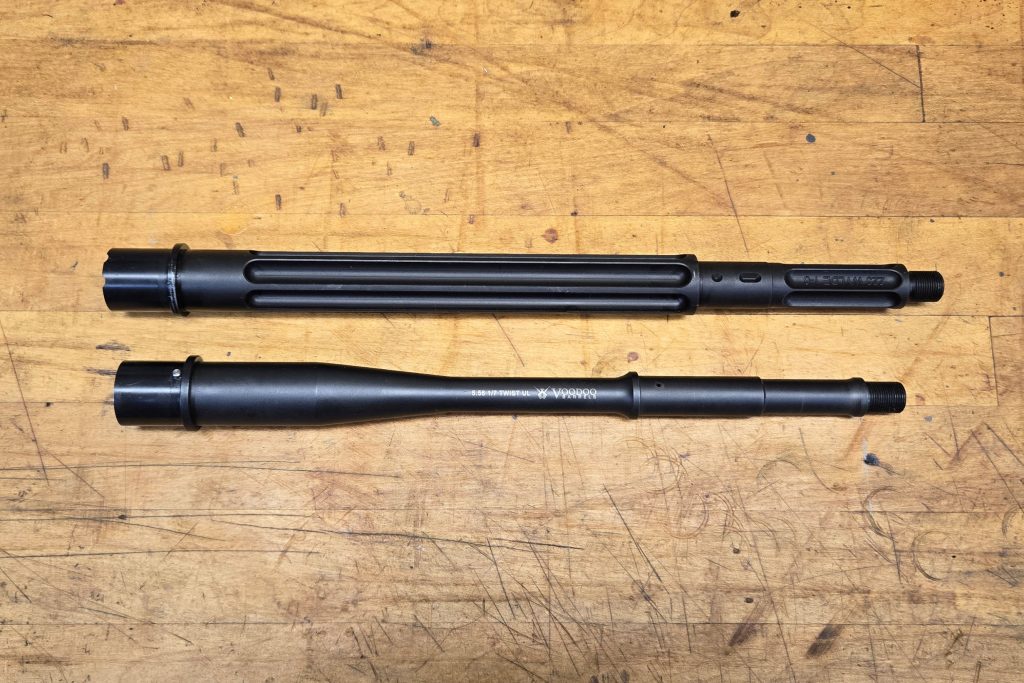
They have a heavy barrel profile, but are fluted for weight reduction and heat dispersion. The machining work and finish are exemplary. X2 says that the Trident is lighter than most carbon fiber barrels. I didn’t look that up, but I did compare the 12.5 inch test barrel I recieved to my 11.5 inch ultra light profile VooDoo barrel. Despite the heavy profile of the Trident it was actually lighter than the slightly shorter, ultra light profile VooDoo. The Trident came in at 18 ounces, and the VooDoo came in at 18.6 ounces. Even though I knew X2 claimed that the Trident was light, that still surprised me.
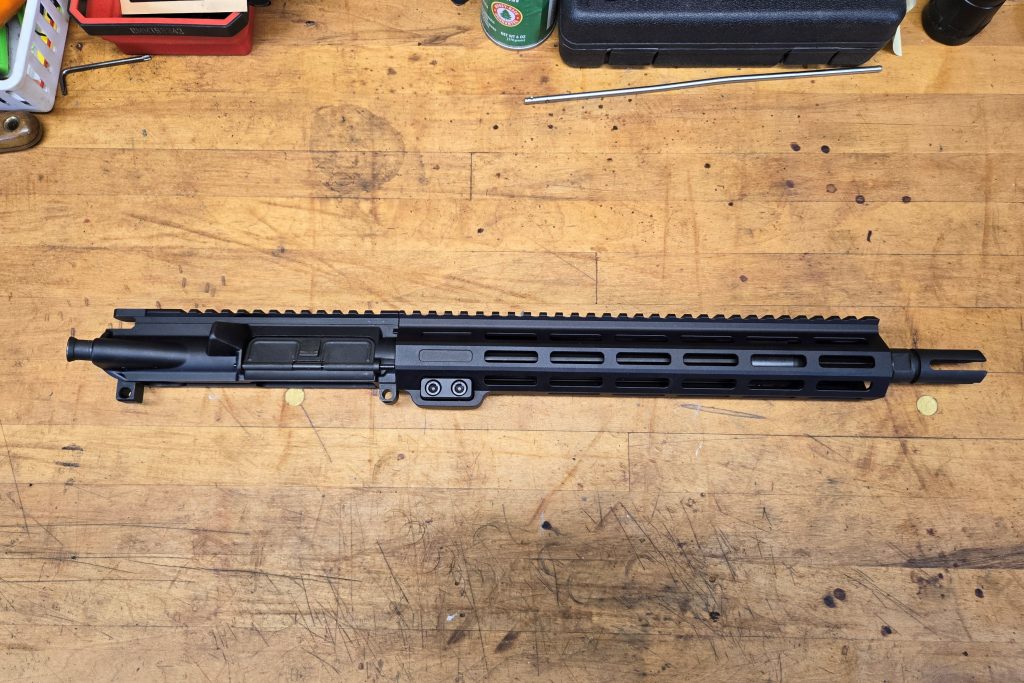
The Build
I decided to use my CMMG MK IV lower for the build. It was a rifle that I had previously SBR’d. It originally had a 12.5 inch barrel, so I went with the 12.5 inch Trident barrel as well. I had a flat top upper on hand, and picked up a 11.7 inch handguard, Big Latch charging handle, and a low profile gas block from KAK Industry. The KAK stuff is pretty reasonable, but quite solid. I use a lot of KAK parts in my builds. I used a Microbest Bolt Carrier Group that I already had on hand.
X2 does make their own gas blocks. They have a X2 Low Profile Fixed Gas block, and a Superlative .750 ADJ Gas Block. I didn’t think to get one when I got the barrel though, so I grabbed the one from KAK when I ordered the other parts. Since the 12.5 inch barrel is a carbine +1 gas system I did get the gas tube with the barrel from X2. The slightly longer gas system makes for a smoother operation than a typical carbine length gas system.
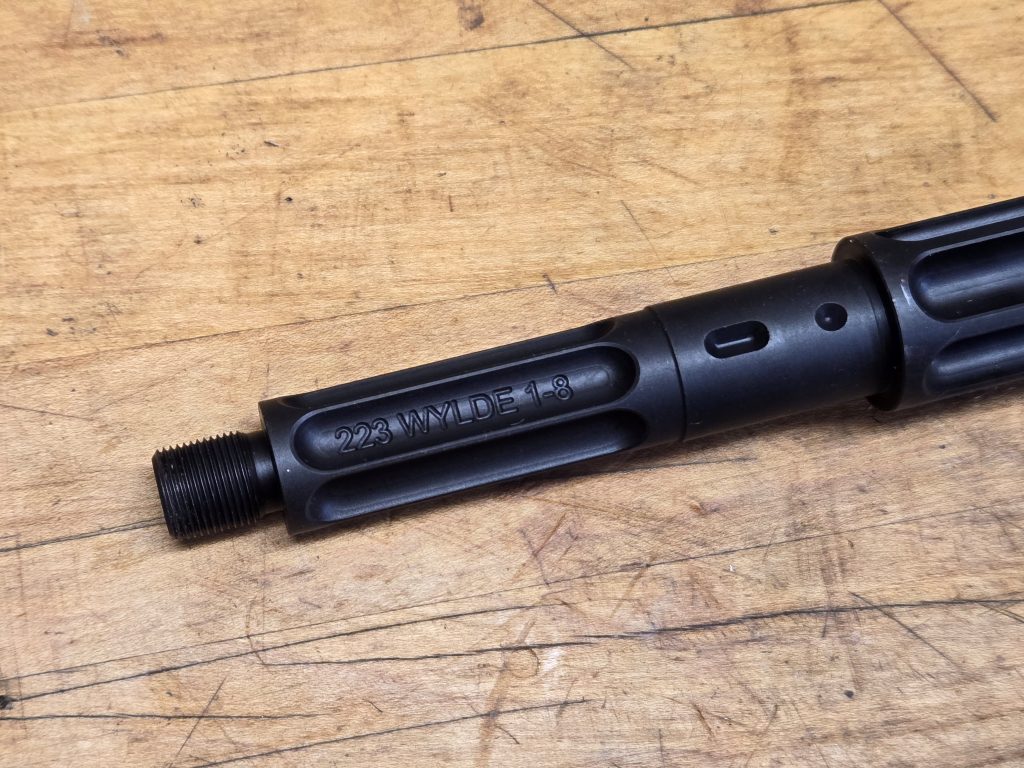
I installed the barrel on the upper using the KAK barrel nut and gas block. One of the nice details on the Trident is the set screw divots in the barrel. Whereas some barrels don’t have anything at all, and others might just have a small drilled spot for a set screw, the Trident has a very nicely machined slot and hole. This makes for perfect gas block alignment and a very positive spot for the set screw to lock into place.
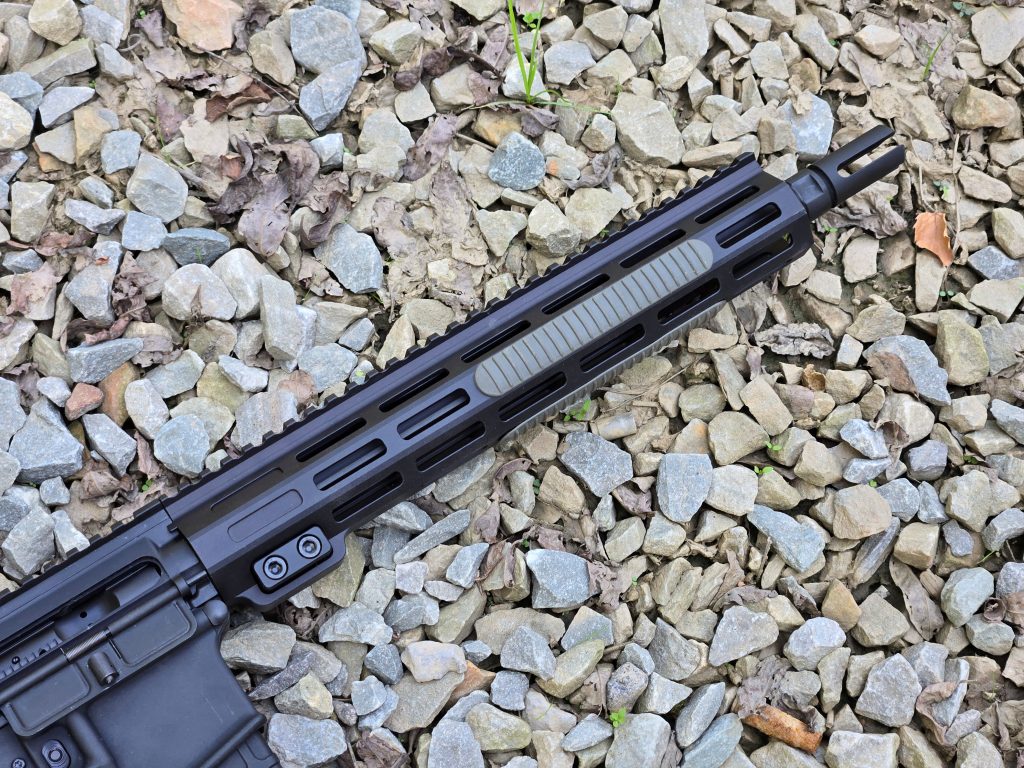
I topped the barrel off with a Young Manufacturing 4 Prong Flash Hider from my parts bin, and added some M-LOK rail covers from B5 Systems. I wanted to really see what the Trident could do, so I took the opportunity to upgrade the trigger in my CMMG lower. I pulled the Mil-Spec trigger and added a CMC Triggers single stage match grade trigger in its place.
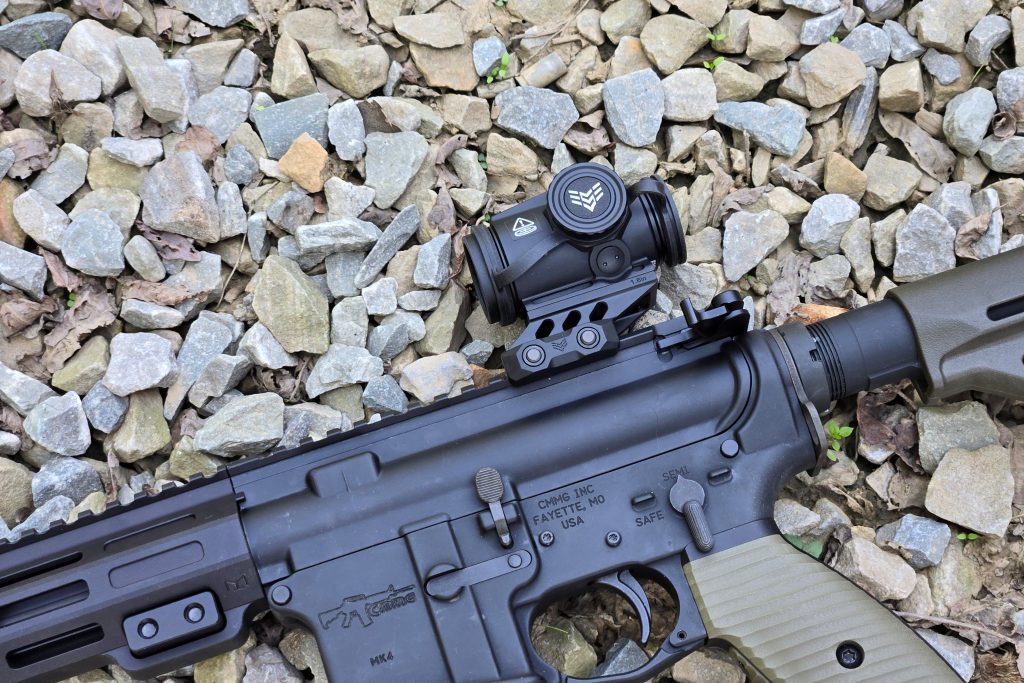
Being that this was an SBR build, I installed a Swampfox Raider Micro Prism sight rather than a magnified optic. The Raider has an illuminated chevron reticle and Bullet Rise Compensation. It also didn’t add much weight or bulk to the build, and I thought it would be a good fit for the 12.5 inch barrel.
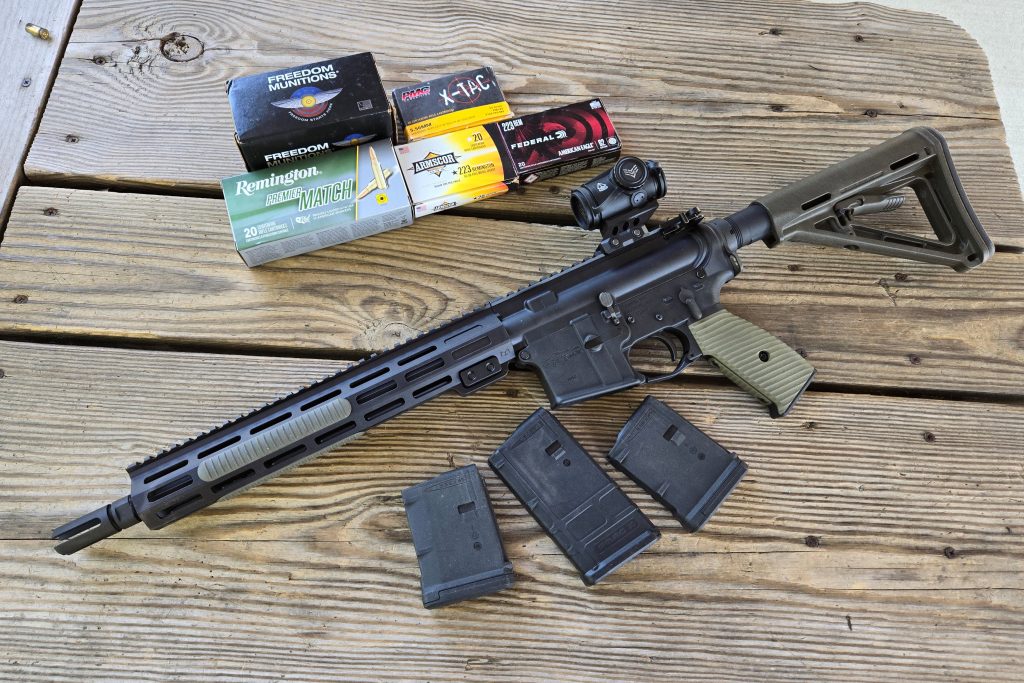
Initial Range Time
I took the Trident build out on a few occasions with a variety of ammo for testing. I had no issues with any of the ammo tested, which was no surprise. The Trident has a nice, well machined set of feed ramps. It fed everything from 55 to 77 grain bullets, and FMJ and hollow point loads, equally.
Sight in with the Swampfox Raider was quick and easy. I used ZQI 62gr FMJ 5.56 NATO rounds, which are just basic mil spec loads. My first session was all done standing, offhand after the initial sight in. I was mainly focused on faster instinctive shooting, and worked on double taps on silhouette targets and engaging reactive targets. At sub 50 yards it was simply a matter of dropping the Raider’s chevron on target and squeezing the trigger. Even bouncing the 5″ Caldwell reactive targets around was easy. I’d barely wait for them to stop rolling before I’d reengage. I pretty much had to work at it to miss.
Rapid fire was interesting. I’m used to handguards heating up during prolonged range sessions, or when doing mag dumps. The fluting on the Trident does do a very good job of heat dispersion though. I won’t say it didn’t get warm when I put enough rounds through the gun in a short period of time, but it was substantially better than with the factory CMMG barrel or similar builds. It also cooled down quicker when it did get warm. I found that especially impressive considering the weight of the barrel, which was less than that of my shorter, lighter profile VooDoo barrel.
The Carbine +1 gas system did seem smoother than a typical carbine. More like a 14.5 or 16 inch midlength gas system than a typical carbine. It should improve reliability a bit too if I decide to add a suppressor to this build. From what I gather, that was a lot of the though behind the Carbine +1 in the first place.
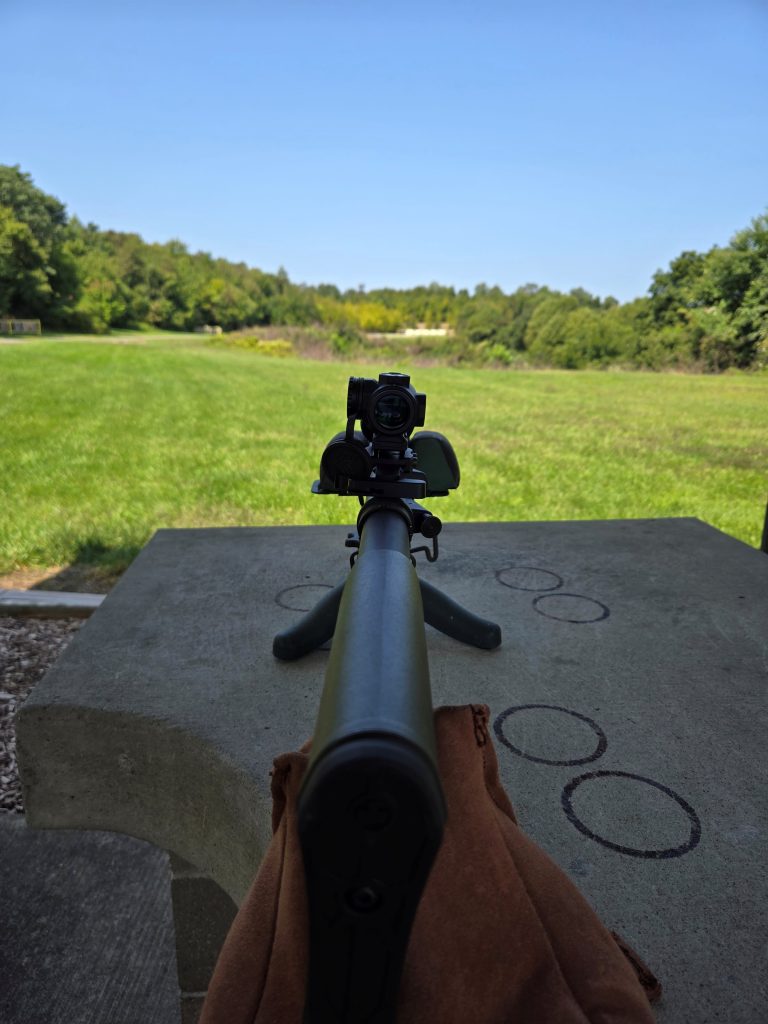
Ringing the Gong
On my second session out I moved over to my clubs 300 yard range. I don’t do much long range shooting honestly. I shoot a lot of pistol, shotgun and SBR. Or I just plink at stuff. So typically I don’t shoot over 100 yards. I felt like I needed to take the Trident out further though, and I wanted to try out the Raider optic at longer range as well. There’s a steel gong out at 300. It’s probably 18 inch or so in diameter, and I figured I’d give that a go.
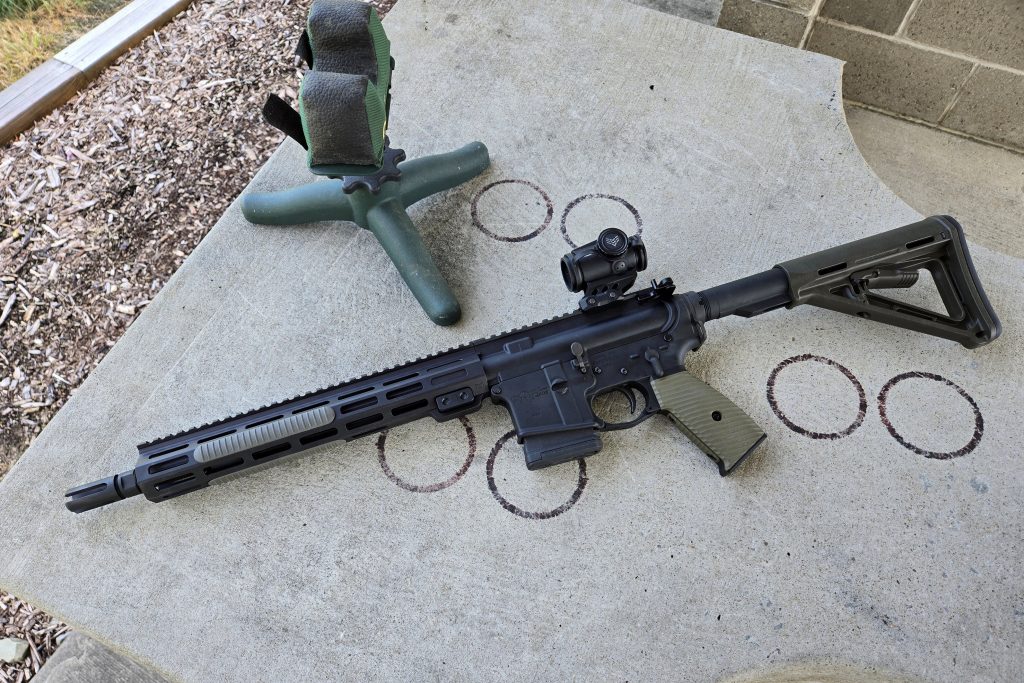
I ended up surprising myself, and being very impressed with both the barrel and the optic. I used a Caldwell rest and a sandbag from the bench. It took me a few rounds to figure out here I was hitting, but I found that if I put the chevron at the top of the steel gong I could ring it steadily. For a 12.5 inch barrel, with a non magnified optic I was pretty happy with that. Especially since I don’t ever practice at that range.
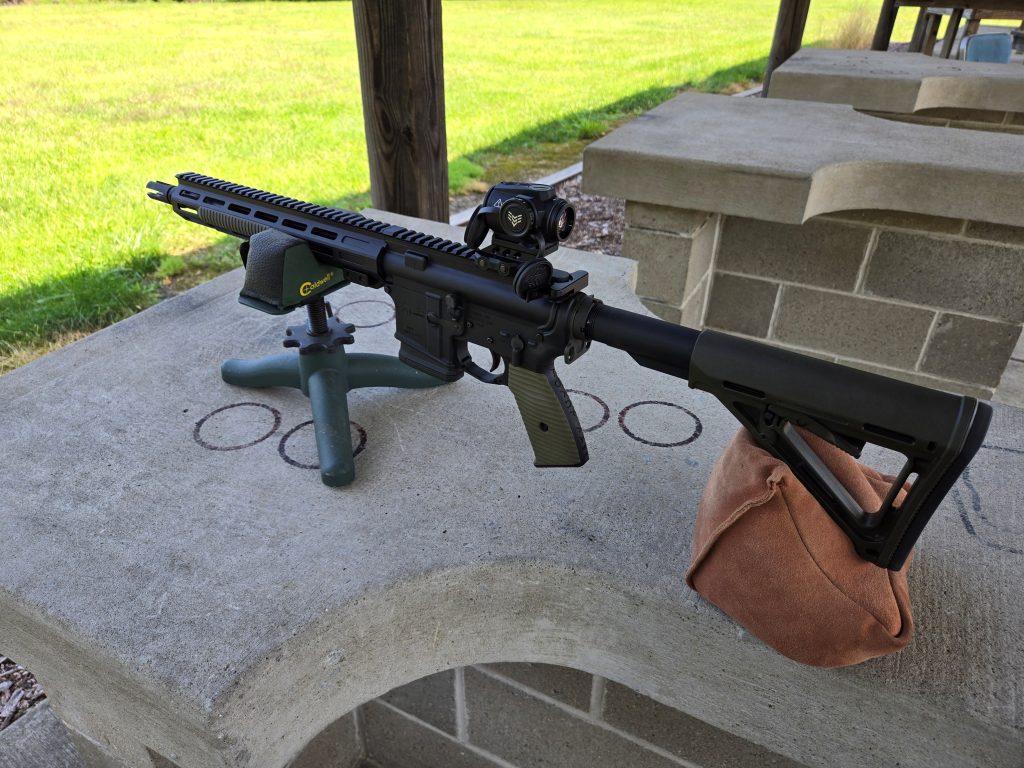
Boring Bench Work
Although I was already pleased with the accuracy and handling of the Trident on my SBR build, I figured I really should bench rest it and see just what it could do. I always find punching paper targets from the bench boring. I much prefer to shoot steel or dynamic targets. It’s probably my ADD, but I like immediate feedback on my hits. Still, in the interest in thoroughness, I swapped out the Raider for a magnified optic and sat down with a variety of loads to test. All shooting was done from the bench with the Caldwell rest and sandbag at 100 yards. Group size is the best center to center 5 shot group out of three 5 shot groups.
Armscor 55gr FMJ 5/8″
Freedom Arms Match 77gr BTHP FMJ 1/2″
Hornady 55gr VMAX 1″
Federal American Eagle 62gr FMJ BT 5/8″
PMC X-TAC 55gr FMJ 7/8″
Remington Premium Matchking 77gr BTHP 3/8″
While all of my groups were very good, the Trident seemed to prefer heavier bullets, with my best groups coming from the 77 grain Remington load. I already said I find punching paper boring and the Trident made it even more boring. I say that in a good way though. I was getting good sub MOA groups with boring repeatability. I did have one of two fliers that I called when I fired them, but I was still dropping rounds on top of each other, and ended up with some impressive groups.
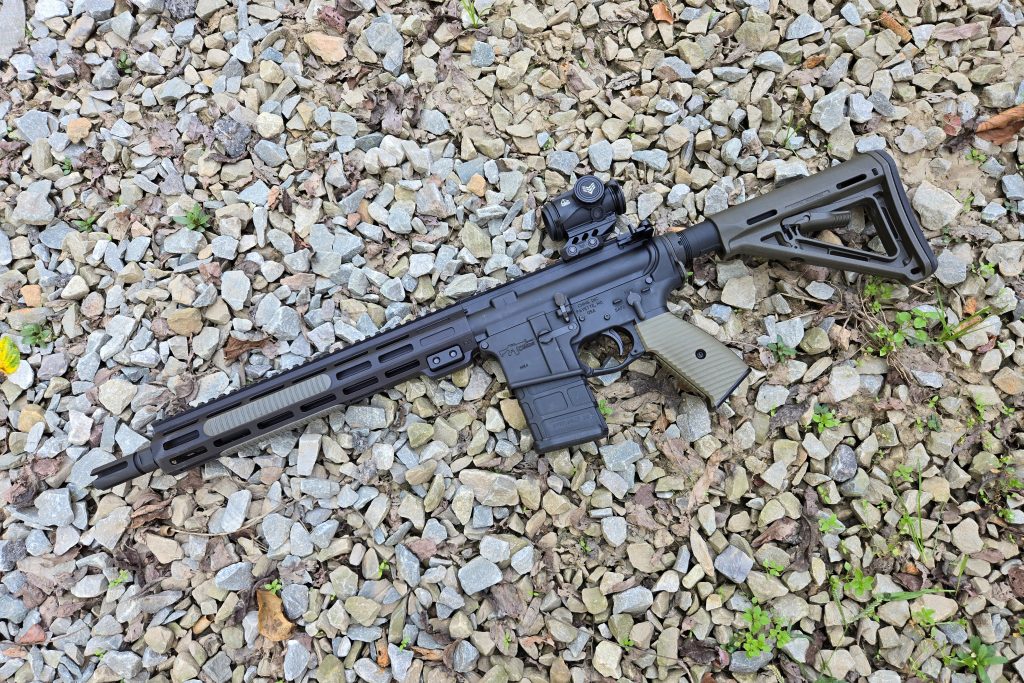
It’s Good, But is it Worth it?
The X2 Dev Group Trident barrel has an MSRP of $549. Adding options like an X2 muzzle brake, gas tube or gas block bump that price up. That’s not inexpensive, and it’s a lot more than I’ve paid for barrels in the past. With that said, you’re getting a top tier product. The Trident is extremely well made. Fit and finish are perfect. The fluting, and gas block divots are precisely machined. The Trident barrels are also lighter than most other barrels of the same length, and stronger than carbon fiber models. The fluting makes it so the barrel doesn’t heat up as fast either, and cools down quicker when it does.
On top of the general build quality, X2 guaranteed sub-MOA performance. I didn’t doubt their word on that, but wondered if I’d be able to hold up my end of that since I don’t do a lot of bench work. I’m going to credit the Trident with the fact that I was able to do it. I’ll have good days and bad days at the range, but all of my days with the Trident were good ones. To me, that repeatability makes the price well worth it.
For more information on the Trident barrel and X2 Dev Groups other products, check out their website at X2 Dev Group.

